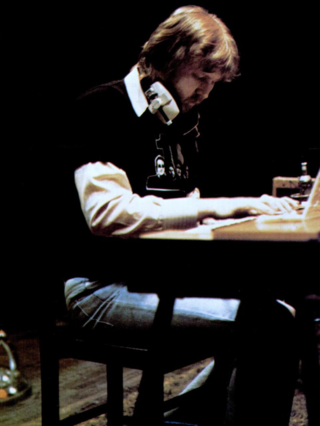
Harry Edward Nilsson III, sometimes credited as Nilsson, was an American singer-songwriter who reached the peak of his success in the early 1970s. His work is characterized by pioneering vocal overdub experiments, a return to the Great American Songbook, and fusions of Caribbean sounds. Nilsson was one of the few major pop-rock recording artists to achieve significant commercial success without performing major public concerts or touring regularly.
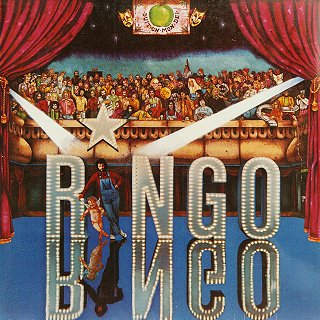
Ringo is the third studio album by English musician Ringo Starr, released in 1973 on Apple Records. It peaked at No. 7 on the UK Albums Chart and No. 2 on the Billboard 200 and has been certified platinum by the RIAA. In Canada, it reached No. 1 on the RPM national albums chart.

A Toot and a Snore in '74 is a bootleg album consisting of the only known recording session in which John Lennon and Paul McCartney played together after the break-up of the Beatles in 1970. First mentioned by Lennon in a 1975 interview, more details were brought to light in May Pang's 1983 book, Loving John, and it gained wider prominence when McCartney made reference to the session in a 1997 interview. Talking with Australian writer Sean Sennett in his Soho office, McCartney said the "session was hazy... for a number of reasons".
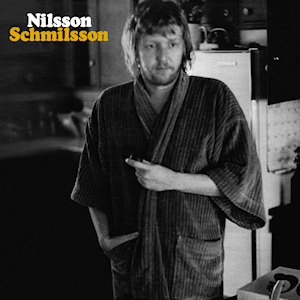
Nilsson Schmilsson is the seventh studio album by American singer Harry Nilsson, released by RCA Records on November 11, 1971. It was Nilsson's most commercially successful work, producing three of his best-known songs. Among these was the number 1 hit "Without You", written by Pete Ham and Tom Evans of the group Badfinger. The album was the first of two Nilsson albums recorded in London and produced by Richard Perry.

Son of Schmilsson is the eighth album by American singer Harry Nilsson, released in 1972 by RCA Records.

"Rock and Roll Music" is a song by American musician and songwriter Chuck Berry, written and recorded by Berry in May 1957. It has been widely covered and is one of Berry's most popular and enduring compositions.

Duit on Mon Dei is the eleventh album by Harry Nilsson. The original title for this album was God's Greatest Hits but management at RCA Records didn't approve. The title is a punning spelling of "Do It On Monday," playing on the British Monarchy's motto Dieu et mon droit. The pun was originally used on the cover of Ringo Starr's 1973 album Ringo.

Flash Harry is the fifteenth studio album by Harry Nilsson. Originally the album was not given a worldwide release and was issued only in the United Kingdom, Japan, Germany, France, Spain, The Netherlands, Australia, and Scandinavia. It was not issued in the United States until August 2013. Upon release it received little promotion from Mercury, with no proper single from the album.

Goodnight Vienna is the fourth studio album by Ringo Starr. It was recorded in the summer of 1974 in Los Angeles, and released later that year. Goodnight Vienna followed the commercially successful predecessor Ringo, and Starr used many of the same players, including Billy Preston, Klaus Voormann, Robbie Robertson, Harry Nilsson, and producer Richard Perry.
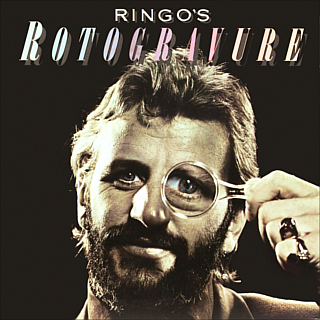
Ringo's Rotogravure is the fifth studio album by Ringo Starr, released in 1976. It was the last project to feature active involvement from all four former Beatles before John Lennon's murder in 1980, and the second of two projects following the band's 1970 breakup to hold the distinction. Following the end of his contract with EMI, Starr signed on with Polydor Records worldwide.

Stop and Smell the Roses is the eighth studio album by English rock musician Ringo Starr. Released in October 1981, it followed the twin commercial failures of Ringo the 4th (1977) and Bad Boy (1978). The album includes the hit single "Wrack My Brain", written and produced by George Harrison, but otherwise failed to find commercial success. It also includes contributions from Paul McCartney, Harry Nilsson, Ronnie Wood and Stephen Stills.

Two Sides of the Moon is the only solo studio album by the English rock musician Keith Moon, drummer for the Who. It peaked at No. 155 on the Billboard 200. The album title was credited to Ringo Starr. Rather than using the album as a chance to showcase his drumming skill, Moon sang lead vocals on all tracks, and played drums only on three of the tracks, although he played percussion on "Don't Worry Baby". The album features contributions from Ringo Starr, Harry Nilsson, Joe Walsh of the Eagles, Jim Keltner, Bobby Keys, Klaus Voormann, John Sebastian, Flo & Eddie, Spencer Davis, Dick Dale, Suzi Quatro's sister Patti Quatro, Patti's bandmates from Fanny Jean Millington and Nickey Barclay, and future actor Miguel Ferrer.

"Back Off Boogaloo" is a song by the English rock musician Ringo Starr that was released as a non-album single in March 1972. Starr's former Beatles bandmate George Harrison produced the recording and helped Starr write the song, although he remained uncredited as a co-writer until 2017. Recording took place in London shortly after the pair had appeared together at Harrison's Concert for Bangladesh shows in August 1971. The single was a follow-up to Starr's 1971 hit song "It Don't Come Easy" and continued his successful run as a solo artist. "Back Off Boogaloo" peaked at number 2 in Britain and Canada, and number 9 on America's Billboard Hot 100. It remains Starr's highest-charting single in the United Kingdom.

"Snookeroo" is a song written by Elton John and Bernie Taupin and released by Ringo Starr on his 1974 album Goodnight Vienna.
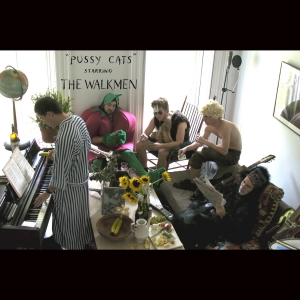
"Pussy Cats" Starring the Walkmen is a studio album by the American rock band the Walkmen, released on October 24, 2006, by Record Collection. The album is a song-for-song cover of the 1974 Harry Nilsson album Pussy Cats which was produced by John Lennon.

Photograph: The Very Best of Ringo Starr is a career-spanning best-of compilation album by Ringo Starr and is the first such album since the releases of 1975's Blast from Your Past and 1989's Starr Struck: Best of Ringo Starr, Vol. 2. The album was released in the UK on 27 August 2007, and in the US on 28 August.

B.B. King in London is a studio album, the nineteenth, by B.B. King, recorded in London in 1971. He is accompanied by US session musicians and various British rock- and R&B musicians, including Ringo Starr, Alexis Korner and Gary Wright, as well as members of Spooky Tooth and Humble Pie, Greg Ridley, Steve Marriott, and Jerry Shirley.

A Sideman's Journey is the first solo album by German musician and artist Klaus Voormann, released in July 2009. Voormann is best known as the creator of the cover art for The Beatles' album Revolver as well as for being a much-in-demand session musician during the 1970s. He played bass on a large number of well-known albums by ex-Beatles John Lennon, George Harrison and Ringo Starr − including All Things Must Pass, Imagine and The Concert for Bangladesh − and by artists such as Harry Nilsson, Doris Troy, Lou Reed, Gary Wright, Carly Simon and Randy Newman. Before then, Voormann had been a member of the 1960s pop group Manfred Mann. A Sideman's Journey is notable for including performances by Paul McCartney, Ringo Starr and Yusuf Islam, among others.

"Oh My My" is a song by English musician Ringo Starr from his 1973 album Ringo. It was also issued as the third single from the album, becoming a top-five hit in the United States and Canada. The recording was produced by Richard Perry and includes backing vocals by Merry Clayton and Martha Reeves.

Brother is the debut album by the American pop-rock duo Lon & Derrek Van Eaton. It was released on the Beatles' Apple record label in September 1972 in the United States and February 1973 in Britain. It includes the single "Sweet Music", produced by George Harrison, and was otherwise produced by Klaus Voormann, a friend and longtime associate of the Beatles. On release, the album received favorable reviews from music critics but failed to achieve commercial success. Rolling Stone critic Stephen Holden hailed it as a "staggeringly impressive first album".



















